formerly eScholarship Editions


|
|
|
|
Your search for
'Military History' in subject
found 8 book(s). | Modify Search | Displaying 1 - 8 of 8 book(s) | |
| 1. | 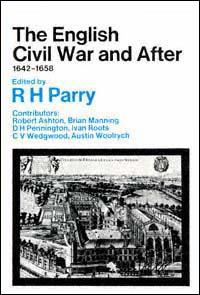 | Title: The English Civil War and after, 1642-1658 Author: Ashton, Robert 1924- Published: University of California Press, 1970 Subjects: History | European History | Military History Similar Items |
| 2. | 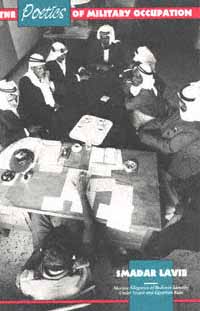 | Title: The poetics of military occupation: Mzeina allegories of Bedouin identity under Israeli and Egyptian rule Author: Lavie, Smadar Published: University of California Press, 1990 Subjects: Anthropology | Cultural Anthropology | Military History | Middle Eastern Studies Publisher's Description: The romantic, nineteenth-century image of the Bedouin as fierce, independent nomads on camelback racing across an endless desert persists in the West. Yet since the era of Ottoman rule, the Mzeina Bedouin of the South Sinai desert have lived under foreign occupation. For the last forty years Bedouin . . . [more] Similar Items |
| 3. | 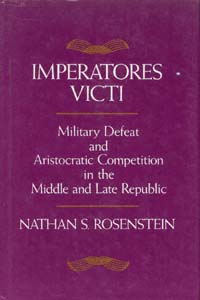 | Title: Imperatores victi: military defeat and aristocratic competition in the middle and late republic Author: Rosenstein, Nathan Stewart Published: University of California Press, 1990 Subjects: Classics | Classical History | Military History | Ancient History Publisher's Description: Given the intense competition among aristocrats seeking public office in the middle and late Roman Republic, one would expect that their persistent struggles for honor, glory, and power could have seriously undermined the state or damaged the cohesiveness of the ruling class. Rome in fact depended on aristocratic competition, since no professional bureaucracy directed public affairs and no salary was attached to any public office. But as Rosenstein adeptly shows, competition appears to have been surprisingly limited, in ways that curtailed the possible destructive effects of all-out contests between individuals. Imperatores Victi examines one particularly striking case of such checks on competition. Military success at all times represented an abundant source of prestige and political strength at Rome. Generals who led armies to victory enjoyed a better-than-average chance of securing higher office upon their return from the field. Yet this study demonstrates that defeated generals were not barred from public office and in fact went on to win the Republic's most highly coveted and hotly contested offices in numbers virtually identical with those of their undefeated peers.Rosenstein explores how this unexpected limit to competition functions, reviewing beliefs about the religious origins of defeat, assumptions about common soldiers' duties in battle, and definitions of honorable behavior of an aristocrat during a crisis. These perspectives were instrumental in shifting the onus of failure away from a general's person and in offering positive strategies a general might use to win glory and respect even in defeat and to silence potential critics among a failed general's peers. Such limits to competition had an impact on the larger problems of stability and coherence in the Republic and its political elite; these larger problems are discussed in the concluding chapter. [brief] Similar Items |
| 4. | 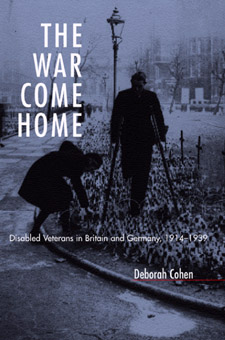 | Title: The war come home: disabled veterans in Britain and Germany, 1914-1939 Author: Cohen, Deborah 1968- Published: University of California Press, 2001 Subjects: History | European History | German Studies | Military History | European Studies Publisher's Description: Disabled veterans were the First World War's most conspicuous legacy. Nearly eight million men in Europe returned from the First World War permanently disabled by injury or disease. In The War Come Home, Deborah Cohen offers a comparative analysis of the very different ways in which two belligerent nations--Germany and Britain--cared for their disabled. At the heart of this book is an apparent paradox. Although postwar Germany provided its disabled veterans with generous benefits, they came to despise the state that favored them. Disabled men proved susceptible to the Nazi cause. By contrast, British ex-servicemen remained loyal subjects, though they received only meager material compensation. Cohen explores the meaning of this paradox by focusing on the interplay between state agencies and private philanthropies on one hand, and the evolving relationship between disabled men and the general public on the other. Written with verve and compassion, The War Come Home describes in affecting detail disabled veterans' lives and their treatment at the hands of government agencies and private charities in Britain and Germany. Cohen's study moves from the intimate confines of veterans' homes to the offices of high-level bureaucrats; she tells of veterans' protests, of disabled men's families, and of the well-heeled philanthropists who made a cause of the war's victims. This superbly researched book provides an important new perspective on the ways in which states and societies confront the consequences of industrialized warfare. [brief] Similar Items |
| 5. | 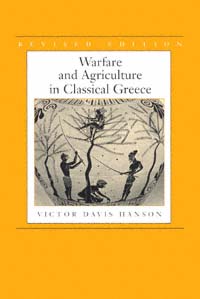 | Title: Warfare and agriculture in classical Greece Author: Hanson, Victor Davis Published: University of California Press, 1998 Subjects: Classics | Classical History | Military History | Ancient History | Classical Politics | Agriculture Publisher's Description: The ancient Greeks were for the most part a rural, not an urban, society. And for much of the Classical period, war was more common than peace. Almost all accounts of ancient history assume that farming and fighting were critical events in the lives of the citizenry. Yet never before have we had a comprehensive modern study of the relationship between agriculture and warfare in the Greek world. In this completely revised edition of Warfare and Agriculture in Classical Greece , Victor Davis Hanson provides a systematic review of Greek agriculture and warfare and describes the relationship between these two important aspects of life in ancient communities. With careful attention to agronomic as well as military details, this well-written, thoroughly researched study reveals the remarkable resilience of those farmland communities.In the past, scholars have assumed that the agricultural infrastructure of ancient society was often ruined by attack, as, for example, Athens was relegated to poverty in the aftermath of the Persian and later Peloponnesian invasions. Hanson's study shows, however, that in reality attacks on agriculture rarely resulted in famines or permanent agrarian depression. Trees and vines are hard to destroy, and grainfields are only briefly vulnerable to torching. In addition, ancient armies were rather inefficient systematic ravagers and instead used other tactics, such as occupying their enemies' farms to incite infantry battle. Warfare and Agriculture in Classical Greece suggests that for all ancient societies, rural depression and desolation came about from more subtle phenomena - taxes, changes in political and social structure, and new cultural values - rather than from destructive warfare. [brief] Similar Items |
| 6. | 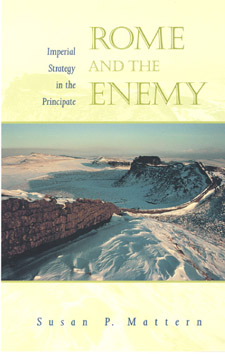 | Title: Rome and the enemy: imperial strategy in the principate Author: Mattern, Susan P 1966- Published: University of California Press, 1999 Subjects: Classics | Classical History | Classical Politics | Classical Literature and Language | Military History | Ancient History Publisher's Description: How did the Romans build and maintain one of the most powerful and stable empires in the history of the world? This illuminating book draws on the literature, especially the historiography, composed by the members of the elite who conducted Roman foreign affairs. From this evidence, Susan P. Mattern reevaluates the roots, motivations, and goals of Roman imperial foreign policy especially as that policy related to warfare. In a major reinterpretation of the sources, Rome and the Enemy shows that concepts of national honor, fierce competition for status, and revenge drove Roman foreign policy, and though different from the highly rationalizing strategies often attributed to the Romans, dictated patterns of response that remained consistent over centuries. Mattern reconstructs the world view of the Roman decision-makers, the emperors, and the elite from which they drew their advisers. She discusses Roman conceptions of geography, strategy, economics, and the influence of traditional Roman values on the conduct of military campaigns. She shows that these leaders were more strongly influenced by a traditional, stereotyped perception of the enemy and a drive to avenge insults to their national honor than by concepts of defensible borders. In fact, the desire to enforce an image of Roman power was a major policy goal behind many of their most brutal and aggressive campaigns. Rome and the Enemy provides a fascinating look into the Roman mind in addition to a compelling reexamination of Roman conceptions of warfare and national honor. The resulting picture creates a new understanding of Rome's long mastery of the Mediterranean world. [brief] Similar Items |
| 7. | 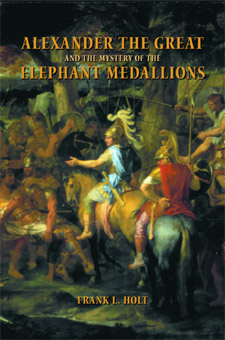 | Title: Alexander the Great and the mystery of the elephant medallions Author: Holt, Frank Lee Published: University of California Press, 2003 Subjects: Classics | Classical History | Ancient History | Military History | Art and Architecture Publisher's Description: To all those who witnessed his extraordinary conquests, from Albania to India, Alexander the Great appeared invincible. How Alexander himself promoted this appearance - how he abetted the belief that he enjoyed divine favor and commanded even the forces of nature against his enemies - is the subject of Frank L. Holt's absorbing book. Solid evidence for the "supernaturalized" Alexander lies in a rare series of medallions that depict the triumphant young king at war against the elephants, archers, and chariots of Rajah Porus of India at the Battle of the Hydaspes River. Recovered from Afghanistan and Iraq in sensational and sometimes perilous circumstances, these ancient artifacts have long animated the modern historical debate about Alexander. Holt's book, the first devoted to the mystery of these ancient medallions, takes us into the history of their discovery and interpretation, into the knowable facts of their manufacture and meaning, and, ultimately, into the king's own psyche and his frightening theology of war. The result is a valuable analysis of Alexander history and myth, a vivid account of numismatics, and a spellbinding look into the age-old mechanics of megalomania. [brief] Similar Items |
| 8. | 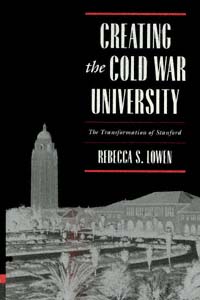 | Title: Creating the Cold War university: the transformation of Stanford Author: Lowen, Rebecca S 1959- Published: University of California Press, 1997 Subjects: History | Education | Technology and Society | Military History | Californian and Western History | History and Philosophy of Science | California and the West | Intellectual History | United States History | United States History Publisher's Description: The "cold war university" is the academic component of the military-industrial-academic complex, and its archetype, according to Rebecca Lowen, is Stanford University. Her book challenges the conventional wisdom that the post-World War II "multiversity" was created by military patrons on the one hand and academic scientists on the other and points instead to the crucial role played by university administrators in making their universities dependent upon military, foundation, and industrial patronage.Contesting the view that the "federal grant university" originated with the outpouring of federal support for science after the war, Lowen shows how the Depression had put financial pressure on universities and pushed administrators to seek new modes of funding. She also details the ways that Stanford administrators transformed their institution to attract patronage.With the end of the cold war and the tightening of federal budgets, universities again face pressures not unlike those of the 1930s. Lowen's analysis of how the university became dependent on the State is essential reading for anyone concerned about the future of higher education in the post-cold war era. [brief] Similar Items |